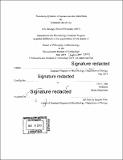Translating dynamics of human-microbe interactions
Author(s)
Chu, Nathaniel David.
Download1149013372-MIT.pdf (21.90Mb)
Other Contributors
Massachusetts Institute of Technology. Department of Biology.
Advisor
Eric J. Alm.
Terms of use
Metadata
Show full item recordAbstract
High-throughput genetic sequencing revolutionized our ability to systematically quantify and analyze biological systems. These methods have been particularly fruitful in understanding the composition and dynamics of the microbial communities that inhabit the human body and how our cells interact with these microbes to maintain health or generate disease. In this thesis, I describe the results of four projects that used high-throughput sequencing to interrogate the dynamics of four systems at the boundary of man and microbe. In the first project, I and my coauthor discovered a mechanism by which marine bacteria dynamically become hypermutators--allowing for rapid adaptation-and we discovered similar mechanisms in clinically-relevant pathogens. In the second project, I developed a new method for targetedly profiling living bacteria in a sample, allowing me to assess the effects of fecal processing on the viability of bacteria in fecal micro biota transplantations. In the third project, I characterized the longitudinal dynamics of the T cell receptor repertoire in healthy people, providing a critical baseline for interpreting changes in the adaptive immune system--our first line of contact with commensals and pathogens. In the fourth project, I tracked the dynamics of engrafting bacteria in a clinical trial of patients with inflammatory bowel disease who received fecal micro biota transplant, demonstrating that patients differ not only in their capacity to accept donor bacteria, but also in their ability to maintain those bacteria. Aside from contributing scientific conclusions about each system, these studies exemplify how genetic sequencing can allow us to directly study the complexity of human subjects, providing a shorter path to translatable clinical insights.
Description
Thesis: Ph. D. in Microbiology, Massachusetts Institute of Technology, Department of Biology, 2019 Cataloged from PDF version of thesis. Includes bibliographical references.
Date issued
2019Department
Massachusetts Institute of Technology. Department of BiologyPublisher
Massachusetts Institute of Technology
Keywords
Biology.